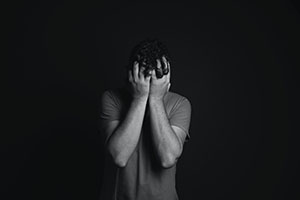OBSESSIVE COMPULSIVE DISORDER
Better Life Therapy offers compassionate outpatient treatment for individuals with OCD
OBSESSIVE-COMPULSIVE DISORDER (OCD)
Obsessive Compulsive Disorder treatment can improve your quality of life.
Obsessive compulsive disorder is one of the most misdiagnosed and under-diagnosed mental health disorders. On average, it takes 17 years to receive a correct diagnosis. If you experience recurrent thoughts and fears that make you feel you must engage in compulsive behaviors, we can help.
Our OCD specialists have heard it all. We can empathize with the paralyzing and isolating experience of having intrusive thoughts run your life.
OCD can be incredibly isolating. It may feel like you must be the only person in the world experiencing the thoughts or images you have. It can also be difficult to focus on relationships when you’re caught up in acting on compulsions to keep obsessive thoughts at bay. OCD can also keep you stuck. Rituals can take minutes or hours from your day and can prevent you from doing the things in your life that matter.

IS IT WORTH IT TO ENGAGE IN EXPOSURE AND RESPONSE PREVENTION?

Better Life Therapy’s OCD specialists have training and experience in ERP, the gold-standard treatment for obsessive compulsive disorder. Our OCD therapists have helped many people learn to understand and manage their OCD symptoms and regain a sense of control in their lives. We know how life changing it can be to work through obsessions in treatment to get unstuck. With the help of an OCD therapist, you can escape the OCD cycle and get more out of life.
Subtypes of obsessive compulsive disorder we treat
- Contamination obsessions
- Hoarding
- Harm obsessions
- Sin, religion, morality or scrupulosity OCD
- Aggressive obsessions
- Sexual obsessions
- Relationship OCD
COMMONLY ASKED QUESTIONS ABOUT OCD
What is Obsessive-Compulsive Disorder?
Obsessive Compulsive Disorder refers to a pattern of unwanted thoughts and fears that can lead to repetitive and often disruptive behaviors. These compulsive behaviors can manifest in countless ways, but they often interfere with daily life and can cause increasingly stressful or conflicting feelings. OCD typically centers around different themes. The examples of potential compulsions are endless, but they might include washing your hands compulsively due to a fear of germs or repetitively snapping your fingers in a certain succession to prevent something bad from happening.


Can’t I just ignore my OCD thoughts?
You can work to avoid or stop your obsessions but without guidance, it can actually do more harm than good and increase your distress and anxiety rather than finding relief. So even with your best efforts to ignore them, they keep coming back, sometimes more frequently, and lead to even more repetitive behaviors. It is highly recommended to connect with a mental health professional such as a therapist to assist in working through OCD thoughts and behaviors.
Isn’t OCD just being a perfectionist?
There is a significant difference between requiring flawless results or performance and having OCD. Obsessive thoughts are not just worries about a problem that go away once it is solved, they are unwanted interruptions that are, at the very least, mild disturbances in your daily life and, at the very worst, crippling distractions that keep you from living your life.

WHAT ARE SOME OF THE SIGNS AND SYMPTOMS OF OBSESSIVE-COMPULSIVE DISORDER?
Obsession Symptoms
Obsessive Compulsive Disorder encompasses a wide variety of thoughts and behaviors with varying degrees of severity so symptoms can look drastically different from person to person. In general, the more common themes of OCD are:
- Fear of contamination (i.e. germs, viruses, dirt, etc.)
- Compulsive need to keep things orderly and/or symmetrical
- Distressing thoughts about losing control
- Distressing thoughts about hurting others
- Persistent unwanted thoughts, usually around aggression, sexual subjects, or abuse
- Difficulty with uncertainty
Examples of common obsessions include but are not limited to:
- Refusal to touch objects or surfaces others have touched unless it has been sterilized
- Consistent doubts such as doubting you have locked the door or turned off the stove
- Intense stress when objects are not in their proper place or in an orderly fashion
- Aggressive or violent thoughts or images such as driving your car into a crowd of people
- Thoughts about acting inappropriately in public
- Unpleasant sexual thoughts or images
- Avoidance of situations that can trigger obsessions, such as shaking hands
Compulsion Symptoms
While obsessions are the unwanted thoughts expressed because of theme or fear, compulsions are the physical manifestations of these thoughts as a way to cope with them. While they almost always look different for everyone experiencing them, some common compulsions are:
- Following a very strict schedule or routine
- Consistent orderliness, cleaning, washing, etc.
- Checking something multiple times
- Counting something multiple times
- Constant need of reassurances
While these lists are not exhaustive, it is recommended that you seek a therapist or medical professional, such as your primary care physician, that can provide an accurate diagnosis and recommendation for treatment.
HOW IS OCD TREATED?
There are many therapeutic approaches that can assist people struggling with OCD in learning how to overcome their obsessions and compulsions. Some of the more common and proven therapy methods are:
- Cognitive Behavioral Therapy (CBT)
- Dialectical Behavioral Therapy (DBT)
- Exposure and Response Prevention Therapy (ERP)
- Acceptance and Commitment Therapy (ACT)
WHAT SHOULD I DO IF I THINK I HAVE OCD?

If you think you may be struggling with OCD, talk to your health care provider and a therapist. Primary care providers routinely diagnose obsessive-compulsive disorder and will refer individuals to qualified mental health professionals for therapeutic treatment.
Better Life Therapy offers comprehensive and effective treatments for OCD. We recognize that it is a serious condition for someone to live with and seeking relief from obsessions or compulsions does not have to be a lonely or painful process. We have qualified and trained therapists standing by who are more than capable to work with people struggling with OCD find relief and pursue their better life.
